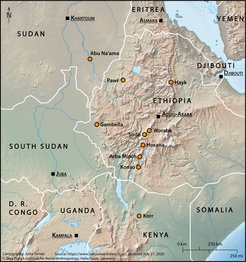Anthropological Observations and Reflections during Corona
Since January 2020 our lives have been defined by the waxing and waning of infection numbers, the media reports on the pandemic, and by the scientific research attempting to manage and explain it. For anthropologists, whose research takes place in the “laboratory” of social life, there is no ignoring the crisis that COVID-19 has brought with it. In ordinary times, the central activity of their work is immersing themselves in the world of the everyday, in rituals, customs, and habits. But for nearly a year, the limits placed on social interaction have been limiting their possibilities to conduct research. Even in lockdown, however, anthropologists remain keen observers of social behaviour and change. During the past weeks, MPI researchers Ursula Rao, Biao Xiang, Günther Schlee, and David O’Kane have reflected on the effects of the pandemic around the world. Their podcast and blog contributions look at greeting customs, new forms of mobility and migration, and the value of local communities in the face of international threats.
In an episode of the science podcast Wissenswert from hr-info, Ursula Rao joins a panel of experts discussing the cultural practice of the handshake and how this form of greeting and farewell has changed as a result of the changed rules for social interaction and contact during the past months. The podcast (in German) can be listened to here.
In his post “Shock Mobility: Acute convulsions in human migration may have long-term impacts” on the Fluchtforschungsblog of the German Network of Forced Migration Researchers, Biao Xiang considers how the pandemic has triggered a phenomenon he refers to as “shock mobility” – a “linking moment” between various already existing movements. The specific forms that this takes and the long-term consequences it can have are illustrated using five empirical examples.
The blog post is available in English and German:
English: https://blog.fluchtforschung.net/shock-mobility/
German: https://blog.fluchtforschung.net/schockmobilitat

The blog of the Leipzig Research Centre Global Dynamics (ReCentGlobe) features two posts by Günther Schlee on the effects of the pandemic in northeast Africa. After Arba Minch University was shut down due to COVID-19, Schlee (who recently took up a professorship there) asked his students to send him “corona diaries” of their experiences. In the resulting exchange, they reflected on the role of morality and religion in the pandemic. Part 1 documents these e-mail conversations between the professor and his students. In part 2 Schlee looks at the influence of the pandemic on both international migration and migration within Ethiopia.
Corona Diaries from Northeast Africa – Part 1: A question of morality and religion?
Corona Diaries from Northeast Africa – Part 2: The Plight of Migrants in Times of Corona
In a post for the blog of the research group “Integration and Conflict along the Upper Guinea Coast”, David O’Kane reflects on Frank M. Snowden’s book Epidemics and Society: From the Black Death to the Present. O’Kane concludes that it is more important than ever to pay attention to local social and cultural structures in the face of the threats presented by the global spread of infectious diseases. “In that case, there will be a vital role for anthropologists. We could learn a lot from reading books like Epidemics and Society, especially if we can write popular texts on disease and society that are as accessible to the layperson as Snowden’s is.”
The blog post can be found here.
